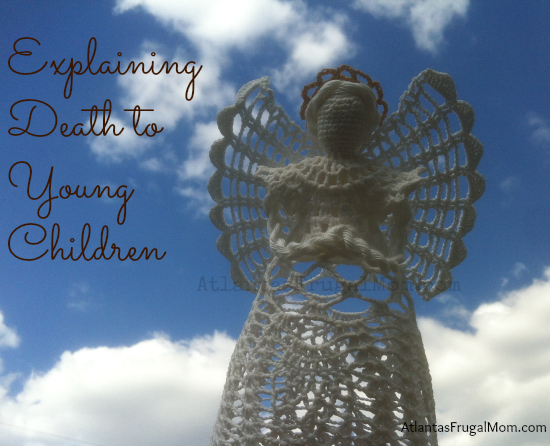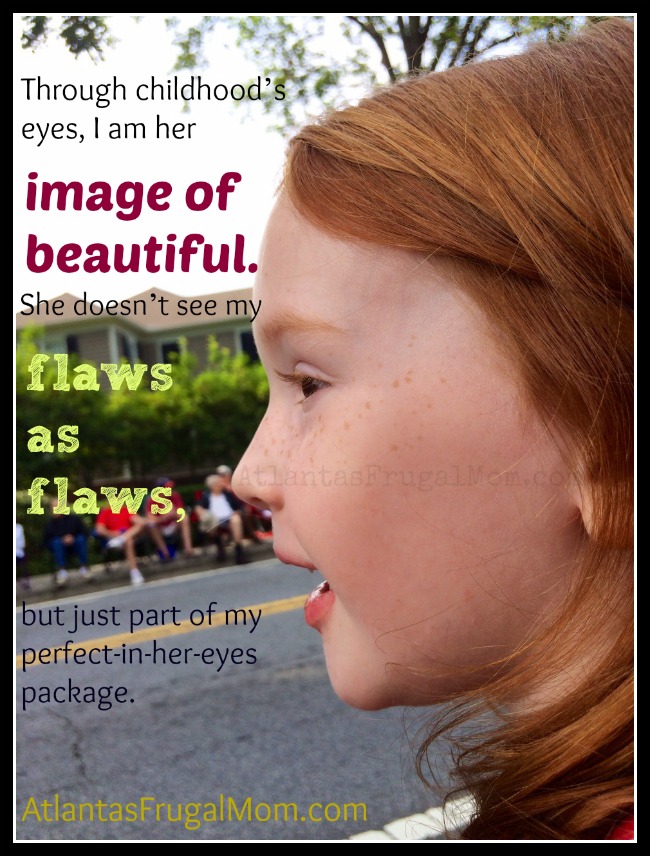Explaining death to young children is never a particularly desirable subject, I find, as we wish to preserve their innocence and shield them from anything that may burst their fragile bubble, believing all is always well in their world. However, death is inevitable. Some folks lose loved ones later in life, while others experience death of a loved one at a tender, young age. Following is my story, explaining death to my five-year-old daughter, Carol.
My grandmother was fortunate enough to raise her five children, not only to see all eight of her grandchildren grow up, but also see her eight great-grandchildren, AND meet three great-great-grandchildren. She lived for almost 18 years after my grandaddy passed away, and was the last of her twelve siblings to survive. She lived through the great depression, and lost her own mother at a very young age. She was, in every sense of the word, a good Southern woman. She had the greenest thumb I’ve ever seen, able to revive even the limpest plant, and made the world’s best cornbread, biscuits, green beans, and fried apple pies. Fond memories of sitting on the front porch, eating watermelon after a big Sunday lunch sit firmly in my memory, holding a very special place in my heart.
She was four days shy of her 95th birthday when she went Home.
We were blessed, really, in the way in which she passed. She had a brain aneurism on a Wednesday afternoon, and never regained consciousness. She spent the next seven days living solely on oxygen, in a quiet little hospice, surrounded by her four surviving children. That Friday after being admitted to hospice care, I was fortunate enough to go see her while the kids were at school. I got to hold her hand, tell her I love her, sit and “visit” with her and my mother and my aunt, and ultimately say goodbye.
It’s never easy saying goodbye to the people you love, whether they’re 25 or 95. Even more difficult, however, is explaining to your young child why they will no longer see someone they love.
For my family, I knew my daughter Carol -who turned five on the day of her great-grandmother’s funeral- would have definite fond memories of her great-grandmama Ruth. My son, who just turned two, although he may remember her, was certainly too young to comprehend what was going on. Given the way in which she held on for seven days, I knew I had to start talking to Carol about what was happening, and prepare my daughter for what was going to happen.
Death was a discussion we’d had already, as she incidentally learned my mom’s friend who passed away about a year and a half ago. That was her first real introduction to death. My mom paved the way, explaining that her friend was in Heaven. Heaven was where God and Jesus were.
So, when I knew my grandmother was dying, I began by telling my daughter that Grandmama Ruth was very sick, and that she was not going to get better – this was a different kind of sick from her tummy bugs, or ear infections. Grandmama Ruth’s body was old, and -unlike her toys who simply need new batteries- we can’t replace parts of people when they stop working. We talked about Heaven, and how the people we love go to Heaven when they die. We also read What Is Heaven by Maria Shriver. And had lots and lots of discussions about death, Heaven, and Jesus. Lots.

Once she passed, we started talking about how her body will go in to the ground, but her soul, which was separated from her body when she died, went up to Heaven to live on with Jesus. We discussed one’s soul, which is difficult enough for an adult to comprehend, let alone a five year old. As best as I could, I explained how Grandmama Ruth’s soul was comprised of the things that made her her, that made her special to us. My daughter talked about how she was nice, and I shared how Grandmama Ruth was always generous in spirit, nurtured those around her, and had a sassy sense of humor.
For days, I grappled with the actual funeral: do I take my five year old daughter, or not? In the end, I decided it was better for her to have the opportunity to say goodbye. I didn’t force her to, but I offered to let her go up to see Grandmama’s body. We had talked enough beforehand about “the box” she would be laying in, and how her eyes would be closed, like she was sleeping. The funeral was that Saturday, the visitation the evening before. During the visitation, I offered her the opportunity to go up with me, and say goodbye to her. She balked a few times, and I didn’t once push her to do so. But shortly before we left -and once the crowd had dissipated from the room, she let me pick her up and we walked over to the casket. I could tell she was a little nervous, but we stood near her, said “I love you Grandmama Ruth”, then we said a little prayer together.
The following day was the funeral, also my daughter’s fifth birthday. Having the entire extended family around seemed helpful, and certainly having my husband home after being out of town for about a week was also helpful. He ended up sitting with her during the service, and we stood together as a family for the short graveside service. My husband held her as she placed a single rose on the casket, and she said one final goodbye.
The following Monday would have been her 95th birthday. So we went to the dollar store, and my daughter picked out a lovely flower balloon. With a sharpie, we wrote a short message “Happy birthday” and “we love you.” We went outside and released it in the air, with the idea that Grandmama Ruth could catch it up in heaven. My mom has been helping her sister to clean out the house, and has brought back small little tokens to pass on to my children. Having these small momentos seems to be helpful as well.
In the end, death is inevitable. This is my journey, and my story of dealing with death with my young child. It’s taken me WEEKS to get this out, and to share with y’all. I hope it proves to be of some comfort to you all, should you find yourself in similar circumstances. For us, the key was talking openly and honestly about what was going on, in simple kid-friendly terms. I did not wish to sugar-coat anything, but put things in to perspective her, so she can start to understand. She still does not truly understand what happened. But, then again, do ANY of us really have a firm understanding of death?
Thank you for letting me share my story, and God bless you all.
Keep on saving! :o)--Barbara
**Remember, y'all, this post may contain affiliate links. I receive a small amount of compensation when you purchase from my links, which I"ll totally blow on waffle fries and sweet tea, y'all!**











